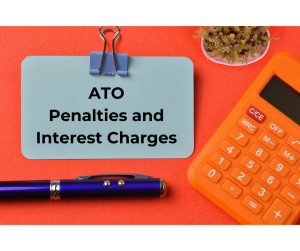Navigating EOFY and Tax Time as a small business owner
As an Australian small business owner, preparing for the End of Financial Year (EOFY) and tax time can be a daunting task.

However, with some simple planning and understanding of key deadlines, regulations, and deductions, you can ensure smoother and less stressful process.
In this blog, we’ll look at the top 10 questions and inquiries that I regularly get asked from small business owners about EOFY and tax time in Australia, providing answers to get your started and references to help you navigate further.
As a qualified Bookkeeper and Virtual Assistant, with over 25 years experience working with business owners, I’m passionate about educating business owners with simple – easy to digest tips and tricks on your business journey.
1. Some Key Dates and Deadlines in Australia:
EOFY and tax submission deadlines can vary depending on how your business is structured and reporting requirements. As a general guideline:
- For most businesses, the EOFY falls on June 30th, with tax returns due by October 31st.
- If you use a tax agent / accountant different lodgment and payment dates may apply.
- Quarterly BAS submissions are typically due one month after the end of each quarter.
- If you use a tax agent / accountant different lodgment and payment dates may apply.
- Superannuation contributions must be paid by the 28th day of the month following the end of each quarter.
- SG contributions are to be received by the superfund by this date. You need to allow enough time for SG payments to reach and be processed by your super fund, especially if using a SG clearing house.
- If you don’t pay the SG contributions for quarter 1 in full and by this date, you must pay the super guarantee charge (SGC) and lodge a SGC statement by 28 November.
- Reference – ATO Due Dates by month
- For most businesses, the EOFY falls on June 30th, with tax returns due by October 31st.
2. Required Documents and Records:
To accurately complete your tax return and comply with ATO requirements, you’ll need to gather various documents and records, including:
- Income records such as sales invoices, receipts, and bank statements.
- Also know as source documents, both physical and electronic, that show transaction dates and amounts
- Expense records including receipts, invoices, and bank statements.
- Also known as source documents, both physical and electronic, that show transaction dates and amounts
- Employee payment summaries and superannuation contribution records.
- Records of assets purchased or disposed of during the financial year, including contracts and other legal documents.
- Understanding who is responsible to keeping business record keeping
- Reference / further reading: ATO Records you need to keep as a business

- Reference / further reading: ATO Records you need to keep as a business
3. Maximising your Tax Deductions:
Small business owners can claim a wide range of deductions (*Remember – you can’t claim private expenses and make sure you keep records to support your claims) to minimise their taxable income, including:
- Operating expenses such as rent, utilities, and office supplies.
- Vehicle expenses for business-related travel.
- Depreciation of business assets.
- Home office expenses for those who work from home.
- Reference: ATO – Deductions for Small Business
4. Keep up with changes to Tax Laws and Regulations:
As riviting as this topic is (not!!) … it’s important to stay updated on any changes to tax laws or regulations that may affect your business. For example:
- Changes to income tax rates or thresholds.
- Company tax rate changes
- Not-for-profit rate changes
- Updates to deductible expenses or eligibility criteria.
- Any new introduction of new tax incentives or credits for small businesses.
- Reference: Business.gov.au – Tax differences between Sole Traders and a Company
- Changes to income tax rates or thresholds.
5. Tax Credits, Concessions and Rebates:
Small businesses and certain business structures may be eligible for different tax credits and incentives designed to foster and support growth and innovation. These may include:
- Tax credits, concessions and rebates are a complex area – so I highly recommend talking with your Accountant or Tax Agent for further advice
- Research and Development (R&D) tax incentives.
- Small business tax offsets.
- Instant asset write-off schemes for eligible business assets.
- Reference: ATO – Small Business Tax Concessions – Is Your Business Eligible?
6. Possible Penalties for Non-Compliance:
Failing to meet EOFY and tax submission deadlines or comply with ATO regulations can result in penalties and fines. These may include:
- Late lodgment penalties for overdue tax returns or BAS submissions.
- Failure to pay penalties for unpaid taxes or superannuation contributions.
- Interest charges on overdue payments.
- GIC – General Interest Charge
- Reference: ATO Penalties and Interest Charges

7. Working with / engaging a Professional:
Engaging an accountant or tax advisor can provide invaluable assistance during EOFY preparations. Working with an experienced professional can:
- Ensure accurate record-keeping and compliance with ATO requirements.
- Identify potential tax deductions that you may have missed and credits to optimise your tax return.
- Provide expert advice on tax planning strategies and business structuring.
- Reference: Business QLD – Working with Accountants, Bookkeepers and Tax Agents
8. Claimable Expenses:
Understanding which expenses are eligible for tax deductions is crucial for maximising your tax return. Common claimable expenses for small businesses include:
- Office rent or lease payments.
- Day-to-day business operating expenses.
- Marketing and advertising expenses.
- Associated professional development and training costs.
- Reference / Further Reading: ATO – Business Tax Deductions
9. Record-Keeping Processes:
Implementing an efficient record-keeping and accounting processes can help you with EOFY preparations and ensure continued compliance. Maybe consider:
- Accounting software for digital record-keeping and reporting, if not already using.
- Setting up automated reminders for tax deadlines and payments.
- Particularly important for Superannuation, IAS & BAS payments.
- Regularly reconciling bank accounts and financial statements.
- Reference: ATO – Record Keeping for a Small Business
10. Choosing the right Accounting Software:
When you are ready to choose accounting software it can be a little overwhelming, but can be critical and more importantly help streamline your record-keeping processes and improve financial management for your small business! Do your research, talk to other business owners; ask what they are using, do they like, the costs etc.
Here are some popular options, both free and paid:
Free Options:
- Wave: Offers accounting, invoicing, and receipt features, on-the-go app, option to accept payments for free.
- Gimbla: A Simple Yet Full-Featured Accounting Software. An Australian based company that aims to transform and streamline the way you manage the accounting needs of your business. We simplify the difficult processes so you have more time to focus on what matters most, your business.
- ZipBooks: Simple, beautiful, and powerful, ZipBooks gives you the tools and intelligence to take your business to the next level.
Paid Options:
- Xero: Cloud-based accounting software with advanced features for small businesses.
- Many Accountants and Bookkeepers favour Xero due to strong reporting, ease of use and cloud based functionality.
- QuickBooks Online: Offers a range of accounting solutions tailored to small business needs.
- MYOB: One business management platform, with all your key workflows – from finance and supply chain, to employee and project management.
- Further Reading: Best Rated Accounting Software – Canstarblue
- Xero: Cloud-based accounting software with advanced features for small businesses.
I hope that these 10 tips are helpful, insightful but most of all make the sometimes nerve racking lead up to tax time a little more stress free! As you navigate EOFY and tax time, remember to stay informed, keep accurate records, and seek professional advice when needed to optimise your tax outcomes and ensure compliance with ATO regulations.
Till next time …
Thanks for checking in today. As always, I do not consider myself a writer, or an expert in particular topics. It’s about enjoying the journey and giving your business information to assist you to grow. I’m proud to work with small business owners, Australia wide and in all areas of administration, office, business matters and virtual assistant tasks, which aim to provide helpful and practical tips and tricks along the way, for you.

Disclaimer:
Information provided in this blog is intended for general guidance and informational purposes only. Every effort has been made to ensure the accuracy and reliability of the information presented (including links), it should not be considered as professional or personalised advice for your business.
Readers are encouraged to consult with qualified professionals such as accountants or tax advisors to address specific concerns or circumstances related to their individual businesses.
Additionally, please note that tax laws, regulations, and financial practices may change over time. The information contained in this blog was accurate at the time of writing and posting.
As a qualified bookkeeper, I aim to provide helpful insights and tips to assist you, the small business owner in navigating EOFY and tax time in Australia. However, readers should exercise their discretion and judgment when applying any information provided herein to their own situations.
